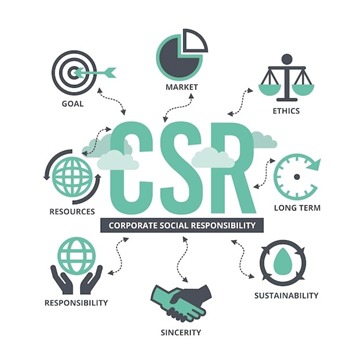CSR (Corporate Social Responsibility) Implementation
Corporate Social Responsibility (CSR) implementation involves integrating social, environmental, and economic concerns into business operations and decision-making. It goes beyond legal obligations and financial interests to benefit society and the environment.
Why Implement CSR?
- Enhanced Reputation: Builds a positive brand image and credibility.
- Customer Loyalty: Attracts and retains customers who value ethical practices.
- Employee Engagement: Boosts morale and fosters a sense of purpose.
- Cost Savings: Promotes sustainable practices, reducing waste and costs.

Key Aspects of CSR Implementation
- Identify Key Areas: Determine which areas of your business have the greatest impact on society and the environment.
- Set Measurable Goals: Define SMART (Specific, Measurable, Achievable, Relevant, and Time-bound) goals for CSR initiatives.
- Develop a CSR Policy: Create a clear policy outlining your company's commitment to CSR.
- Assign Responsibility: Clearly define who is responsible for implementing and monitoring CSR activities.
- Partner with Stakeholders: Collaborate with employees, customers, suppliers, and community organizations.
CSR Initiatives
- Choose Relevant Activities: Select CSR activities aligned with your company's values and stakeholder needs.
- Allocate Resources: Dedicate budget, personnel, and time to CSR initiatives.
- Monitor and Evaluate: Track progress and assess the impact of CSR initiatives.
- Communicate Your Efforts: Share CSR achievements with stakeholders both internally and externally.
- Continuous Improvement: Regularly review and refine your CSR strategy for effectiveness.
CSR in India
- Companies Act, 2013: Mandates certain companies to spend a portion of their profits on CSR activities, promoting social welfare and sustainable development.
- CSR Committee: Companies must establish a CSR committee to oversee planning, implementation, and monitoring.
- Implementation Agencies: Companies can execute CSR activities directly or through registered trusts, societies, or charitable organizations.
- Focus Areas: CSR activities in India often include education, healthcare, poverty alleviation, environmental sustainability, and community development.
